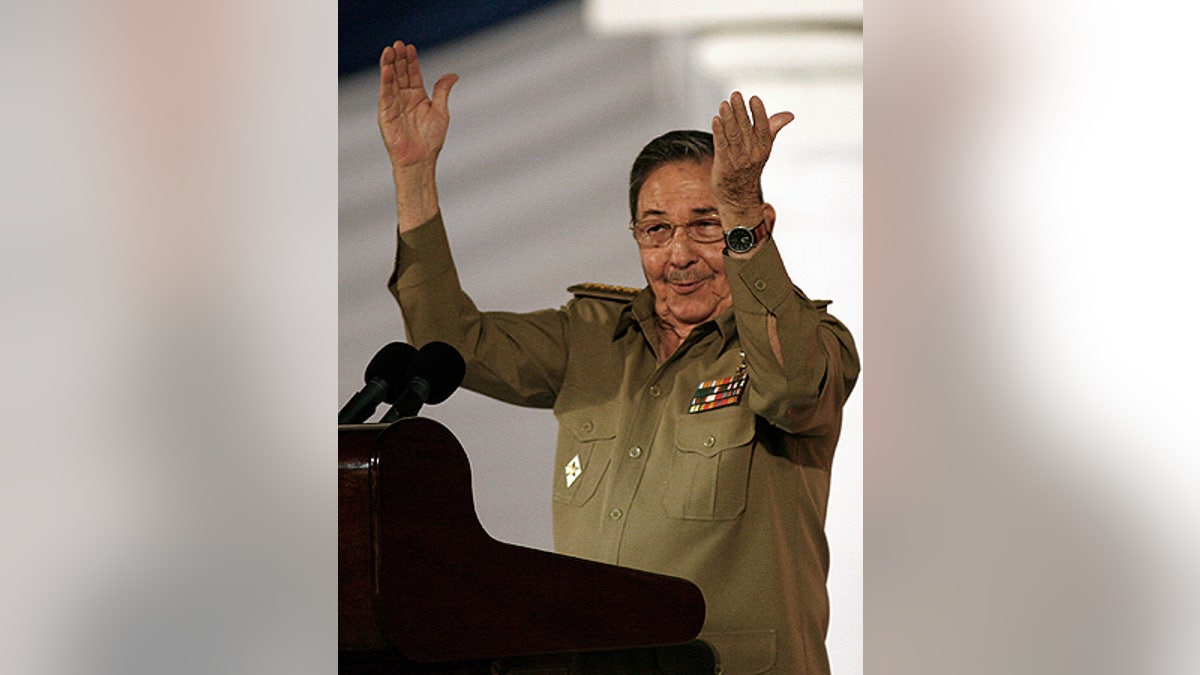
Jan. 1: President of Cuba, Raul Castro speaks during the 50th anniversary celebration of the Cuban Revolution at the main plaza in Santiago, Cuba. (AP)
SANTIAGO, Cuba – President Raul Castro predicted Cuba's revolution would survive another half-century as the communist government marked the 50th anniversary of its triumph with subdued celebrations amid fears of economic hardship following three devastating hurricanes.
Thursday's festivities were held under the enduring public absence of the ailing Fidel Castro, who led the band of bearded rebels down from Cuba's eastern mountains to topple dictator Fulgencio Batista's government on Jan. 1, 1959.
"We know that a man alone doesn't make history. But some men are indispensable, as they can have a decisive influence in the course of events. Fidel is one," Raul Castro said of his older brother, who is convalescing in private after undergoing major intestinal surgery almost 2 1/2 years ago.
Raul Castro, speaking beneath the balcony where his older brother declared victory, vowed to "continue to struggle incessantly" and said the revolution would last another "50 years."
The new year begins for Cuba amid hope for the possibilities for increased cash and visitors to the island, and other changes that might ease Cubans' daily hardships. But it also comes amid grim economic assessments after three hurricanes this year caused $10 billion in damages and rising food prices have caused imports costs to surge.
Many here hope for improved relations with the United States when Barack Obama takes office Jan. 20 following declarations by the president-elect that he would talk directly with Raul Castro and lift severe restrictions on family travel and remittances to the island.
Raul Castro, who succeeded his older brother in February, quoted extensively from Fidel as he spoke for less than 40 minutes on a small, leafy plaza to 3,000 Communist Party faithful.
He cited from his brother's 2005 speech at Havana University, warning "this revolution can destroy itself" and that if it occurred, "it would only be our own fault."
The rebels' victory a half-century ago was doubly important "for it has been attained despite the unhealthy and vindictive hatred of the powerful neighbor," Castro said, referring to the United States.
He cited the Bay of Pigs invasion by U.S.-trained exiles, the U.S. embargo, the Cuban missile crisis and assassination attempts against his brother.
"One way or another, with more or less aggressiveness, every U.S. administration has tried to impose a regime change in Cuba," he said.
When President George W. Bush leaves office, the revolution will have outlasted 10 American presidents who maintained strict U.S. sanctions aimed at overthrowing the Cuban leadership.
No foreign leaders attended. Bolivian President Evo Morales saluted the Cuban revolution from La Paz, declaring "my respect, my admiration for Fidel."
Venezuelan President Hugo Chavez announced that in honor of the 50th anniversary, the Cuban flag would fly permanently outside the Venezuelan tomb of South American independence leader Simon Bolivar.
Fidel Castro's health is a state secret, but the 82-year-old released a brief statement on the anniversary's eve congratulating "our heroic people."
The 77-year-old Raul Castro, meanwhile, has made some changes but has yet to introduce the major reforms to the communist system many had hoped for when he came to power.
While Cuba has praised for advancing health care and literacy, its human rights record has been criticized.
The Havana-based non-governmental Cuban Commission for Human Rights and Reconciliation last counted 219 political prisoners on the island, down from as many as 15,000 in 1964.




















